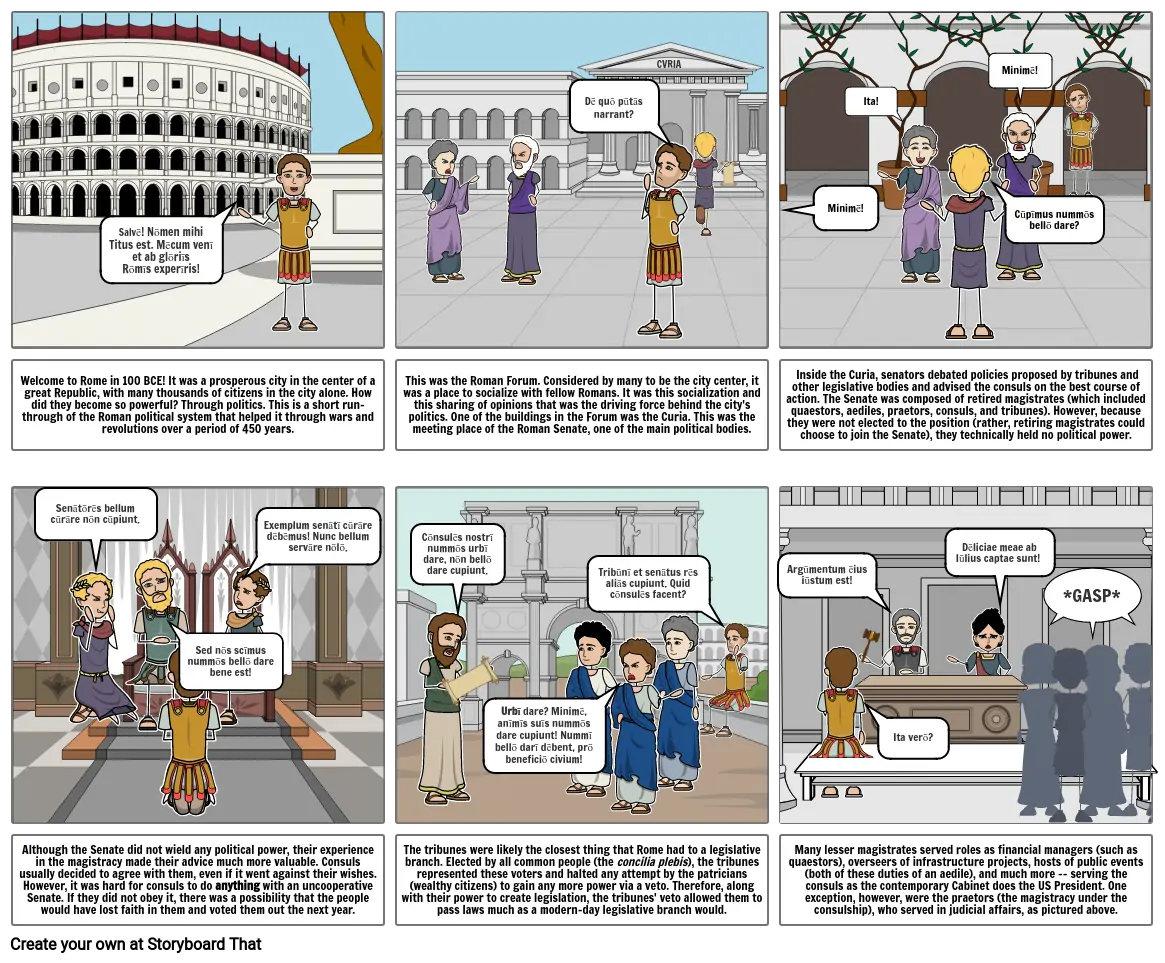TMC | Latin I Final Project 2021 / Page 1

Storyboard Text
- Salvē! Nōmen mihi Titus est. Mēcum venī et ab glōriīsRōmīs experīris!
- Dē quō pūtāsnarrant?
- CVRIA
- Minimē!
- Ita!
- Minimē!
- Cūpīmus nummōs bellō dare?
- Welcome to Rome in 100 BCE! It was a prosperous city in the center of a great Republic, with many thousands of citizens in the city alone. How did they become so powerful? Through politics. This is a short run-through of the Roman political system that helped it through wars and revolutions over a period of 450 years.
- Senātōrēs bellum cūrāre nōn cūpiunt.
- Sed nōs scīmus nummōs bellō dare bene est!
- Exemplum senātī cūrāre dēbēmus! Nunc bellum servāre nōlō.
- This was the Roman Forum. Considered by many to be the city center, it was a place to socialize with fellow Romans. It was this socialization and this sharing of opinions that was the driving force behind the city's politics. One of the buildings in the Forum was the Curia. This was the meeting place of the Roman Senate, one of the main political bodies.
- Cōnsulēs nostrī nummōs urbī dare, nōn bellō dare cupiunt.
- Urbī dare? Minimē, anīmīs suīs nummōs dare cupiunt! Nummī bellō darī dēbent, prō beneficiō civium!
- Tribūnī et senātus rēs aliās cupiunt. Quid cōnsulēs facent?
- Argūmentum ēius iūstum est!
- Inside the Curia, senators debated policies proposed by tribunes and other legislative bodies and advised the consuls on the best course of action. The Senate was composed of retired magistrates (which included quaestors, aediles, praetors, consuls, and tribunes). However, because they were not elected to the position (rather, retiring magistrates could choose to join the Senate), they technically held no political power.
- Dēliciae meae ab Iūlius captae sunt!
- *GASP*
- Although the Senate did not wield any political power, their experience in the magistracy made their advice much more valuable. Consuls usually decided to agree with them, even if it went against their wishes. However, it was hard for consuls to do anything with an uncooperative Senate. If they did not obey it, there was a possibility that the people would have lost faith in them and voted them out the next year.
- The tribunes were likely the closest thing that Rome had to a legislative branch. Elected by all common people (the concilia plebis), the tribunes represented these voters and halted any attempt by the patricians (wealthy citizens) to gain any more power via a veto. Therefore, along with their power to create legislation, the tribunes' veto allowed them to pass laws much as a modern-day legislative branch would.
- Many lesser magistrates served roles as financial managers (such as quaestors), overseers of infrastructure projects, hosts of public events (both of these duties of an aedile), and much more -- serving the consuls as the contemporary Cabinet does the US President. One exception, however, were the praetors (the magistracy under the consulship), who served in judicial affairs, as pictured above.
- Ita verō?
Over 30 Million Storyboards Created

